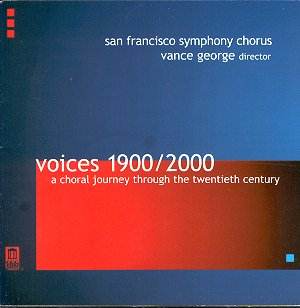
|
VOICES 1900/2000: A Choral Journey Through The Twentieth Century John Tavener (b 1944): Song for Athene (1990) Gyorgy Ligeti (b 1923): Reggel (Morning) (1955) Claude Debussy (1862-1918): Dieu Qu'il La Fait Bon Regarder from Trois Chansons de Charles d'Orleans (1908) Henk Badings (1907-87): La Nuit en Mer from Trois Chansons Bretonnes (1948)* Francis Poulenc (1899-1963): Bois meutri from Un Soir de Neige (1944) Carl Rutti (b 1949): Ite Missa Est from Missa Angelorum (1993) Randall Thompson (1899-1984): Alleluia (1940) Aaron Copland (1900-90) arr. Conte: Simple Gifts (1944/1997)* Aaron Jay Kernis (b 1960): How the Soul Speaks to God from Ecstatic Meditations (1998) Conrad Susa (b 1935): Winds of May from Six Joyce Songs, Vol. 2 (1984)* Morten Lauridsen (b 1943): O Love, Be fed With Apples While You May (1991)* Samuel Barber (1910-81): The Coolin' from Reincarnations (1942) Meredith Monk (b 1943): Earth Seen From Above (1991) Other Worlds Revealed from Atlas (1987) Trad. Arr. A. Parker: Hark, I Hear the Harps Eternal Trad. Arr. J. Erb: Shenandoah Jerome Kern (1885-1945): All the Things You Are from Very Warm for May (1939) Leonard Bernstein (1918-90): Make Our Garden Grow from Candide (1955)* Vance George, Director *Marc Shapiro (piano) Crotchet AmazonUK AmazonUS Amazon recommendations |
Established in 1972, the San Francisco Symphony Chorus is a choir of 200 singers, 30 of whom are professionals. Vance George, their third Director, has been in post since 1983.
Mr. George, who presumably devised this programme, describes it as " a choral portrait of the past century. It is a story of Romanticism, Expressionism, Impressionism and Minimalism." The pieces collected here illustrate one or other of these genres.
I have previously heard quite a number of the pieces on this CD but almost always in performances by chamber choirs. I wondered therefore if that might make it difficult for me to enjoy the same pieces sung by a large group. However, Mr. George has built up a flexible and supple choir and I never found the sound too "big" for any of the pieces.
The programme calls for linguistic as well as musical virtuosity for the choir is required to sing in French, Latin and Hungarian as well as in English. Neither the polyglot nature of the music, nor its stylistic variety seems to trouble them at all and they cope effortlessly with all the musical demands. Their sound, tone and ensemble are excellent throughout.
There were several highlights for me. These included the three pieces in French (sensibly grouped together), all of which receive beautifully warm performances. I also greatly enjoyed their mellifluous and marvellously controlled account of Randall Thompson's ecstatic Alleluia and the tender and lilting Barber setting. Of the pieces new to me Conrad Susa's Winds of May, with its swinging choral lines above a virtuoso piano part, made the strongest impression. And it is hard to resist the irresistible joy of the setting of the spiritual, Hark, I Hear the Harps Eternal, particularly when sung as well as is here the case.
Not everything is quite on the level of those items. Quite why the American composer, Meredith Monk should be the only composer to be represented by two compositions is beyond me. In particular I found the pointless meanderings of Earth Seen from Above a complete bore - to make matters worse it is also the longest item in the programme!. I would far rather have seen one of John Adam's choruses from The Death of Klinghoffer included. Adam's music has far more substance than that of Ms Monk appears to have. The other big disappointment is the anonymous arrangement of the Jerome Kern song. I can't understand why the introductory verse has been omitted (all we get is the refrain, sung twice) and the arrangement is so fussy that the tune itself - one of Kern's best - is often buried. A great pity.
However, most of this collection is very enjoyable and it shows off the choir to good effect. The standard of performance is consistently high and the recording quality is very good. Full texts are provided and the notes are adequate.
John Quinn